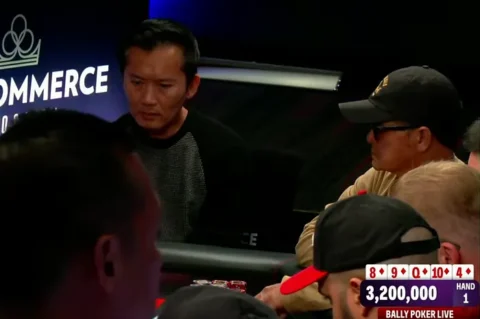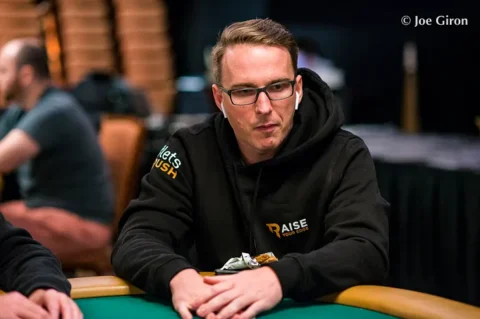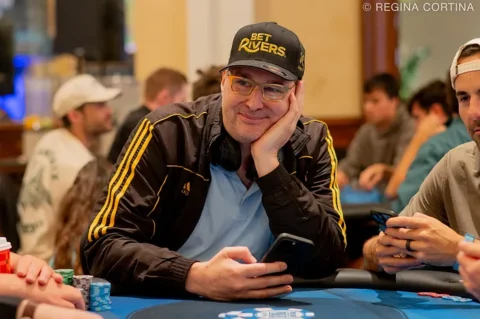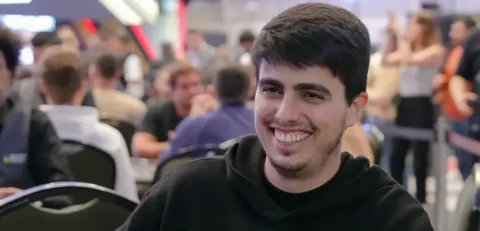Alex O’Brien defines herself as a science writer, and her works have been published in the BBC, The Guardian, The Times and New Scientist. When she is not writing she plays poker, and as of this writing she has achieved tournament poker results in six different countries. Last year she published her first book called The Truth Detective, in which she was able to combine her two passions by writing a science book on how to think like a poker player. The book had excellent reviews and was nominated in the Best Written Content category for the 2023 Global Poker Awards.
We reached out to Alex to tell us how the idea for the book came about, how she experienced the writing process and the interviews she conducted for the book. We also asked her about the GPA nomination, the live tournaments she played since 2014, women in poker, and many more topics. After the interview you will be able to read a short review with this author’s opinions of the book.
I spent 4.5 years of my life writing about the Venn diagram between science & poker.
The book champions science and the scientific method. In the process it repositions the game as a highly-cerebral, multidimensional, strategic puzzle game.
I did my best. Was it enough, @gpi? https://t.co/yz2yw8J9Uu
— Alex O’Brien (@obrientweet) February 14, 2024
Interview with Alex O’Brien
How did you find out about poker and what did you like most about the game at first?
My story with poker began when a female writer friend told me that she was a poker player at night. I was very surprised, since I knew the game from the movies and it was played mostly by men. Since I don’t like limitations, I asked him to teach me how to play and he did just that.
What I liked the most was its complexity. Before learning to play I thought that the most important thing was to know how to bluff and have a good poker face. Then I realized that poker was much more than that and that intelligence was needed to be a good player. That attracted me a lot.
Did you spend time studying or were you more into learning by playing?
When I started studying 10 years ago there weren’t many poker training sites, study groups, or many online study tools. Yes, there were many videos on YouTube and I remember watching those by Daniel Negreanu or Annie Duke where they gave basic advice. I would have liked to study properly those first years, since I think I would be a completely different player. Years ago solvers or the GTO study did not exist. I also think I did quite well considering the little study I had.
Your first result in Hendon Mob is from 2015 in a £200 WPT National London event. What do you remember about that tournament?
I remember that tournament very well for several reasons. Before that tournament I used to play £30 events since I had only been playing live for six months and I didn’t feel ready to play bigger tournaments. But the casino dealers convinced me to play it since they told me I was good enough.
I signed up and being able to get into collections was something epic. I also remember that I was the last woman to be eliminated and I promised a friend that if I made it to the final table I would wear a typical German outfit. The promise still stands, so if I make it to a final table in a major tournament you’ll see me dressed in German style!

Alex with her friend Dara O’Kearney
How did the idea of writing a poker book come about? How long did it take you to finish it?
The idea to write it first came from an editor, who wanted me to write about the psychology of lying. Then the idea transformed into what this book would become: how to think like a poker player using thinking methods and skills. I planned to write it in 18 months, but in the middle of work the coronavirus pandemic arose and delayed all my plans.
I couldn’t move forward at that time and I remember calling the editor to tell him my problems. I was lucky that he told me not to worry about time and to focus on making the best book I can. It was great to have that support and four-and-a-half years later I was able to finish it.
It took me so long to write it because I didn’t want to make mistakes with the facts I mentioned. A book about truth cannot contain falsehoods. I interviewed hundreds of people and had to do a lot of research on each topic. I felt very proud to finish it since I wrote a book that I myself would want to read and I was able to cover a wide range of readers. Poker players will like it as it legitimizes their game, those who want to learn about poker will like it as they will learn what the game is about and science lovers will enjoy the scientific methods that are applied. It makes me very happy that I was able to make a balance between science and poker.
What parts of the writing process did you enjoy the most?
I loved the question and no one had asked it before. I really enjoyed two parts and the first was the discovery. Surprising me with studies that would go great in the book and getting excited about it was the best part without a doubt. And what I also really enjoyed was meeting people, as I had the perfect excuse to meet some of the brightest minds in science, courageous researchers and fantastic poker players.
For the book you had interviews with many interesting people. Who did you most enjoy talking to? Do you think most of them could be good poker players?
It is a difficult question to answer, since many times during the interviews I had to pinch myself to see if it was true that I was talking to them. For example, Jeff Hancock, who is one of the eminences in lie detection, told me that he was playing poker with good results. Poker is a game of intelligence that requires applying critical thinking and scientists do exactly that. Many of them would be great poker players, as they have a curious, investigative and competitive nature. I was lucky enough to interview brilliant and prolific people and 99.9% of those I had planned gave me their time, which made me very happy.
This is great stuff and true in my experience. pic.twitter.com/xs4MEiDu0b
— Jaime Staples (@jaimestaples) March 2, 2024
In the book you tell about a bad experience you had at a table simply because you were a woman. Do you think the situation is different today or do similar events continue to happen?
I think the situation is different today and I notice that organizers, platforms and other players celebrate women’s achievements more. Women in poker are talked about more as just another player and that’s how it should be. I also see that Ladies tournaments have better structures and guarantees. I think a lot more is done for women in poker today than 10 years ago, but there is still a long way to go.
Female participation in tournaments remains very low. Do you think that may change in the future? What promotional actions would you carry out to capture the attention of women?
I don’t think there is a single answer that will change the root of the problem. Rather, several changes and calibrations are needed within the industry to achieve improvements. Many are working on them and the more work is done, the closer we will be to seeing changes.
Thank you @Tantina1 for asking me to co-host the women’s championship! What a day!
Smashed the guarantee by 2.5x, record number of entries (57), one of the fiercest women’s fields ever, laughed all day, got to final table, signed copies of my book. Came second! Still smiling.
pic.twitter.com/ZkThiAarql
— Alex O’Brien (@obrientweet) February 5, 2024
You have four final tables and two second place finishes in ladies tournaments. Will you try to go for first place this year? What are your poker plans for the rest of 2024?
Of course I want to win a tournament! Every time I sit down to play I want to be the champion and I was close many times. I’ve been playing some festivals in the first few months of this year and I’ve been in Las Vegas for the World Series of Poker. But after that I’m going to focus on writing my second book, which won’t be about poker.
Would you like to write a second poker book in the future?
I haven’t thought about it yet, but it could be if the opportunity arises. Maybe it could also be teaming up with another author. I don’t have it in mind at the moment, but maybe it will come up in the future.
Last year you were in Las Vegas and notched two cashes in WSOP tournaments. Tell us what that experience was like.
Yes, last year was amazing. It was my second time at the World Series of Poker, but I was a completely different player since she had learned to study, improve my game and find my leaks. The hard work paid off and I was able to achieve two cashes.
What did it mean to you to be nominated for the Global Poker Awards?
It was a great honor to be nominated for the second time. I felt very appreciated by the industry that nominated me for my first book. I couldn’t win, but being nominated in that category meant a lot to me.

Poker Book Review: The Truth Detective
The first word that comes to mind to describe this book is original. We are used to reading poker books about strategy, mental game, personal experiences, novels and biographies. But The Truth Detective does not fall into any of those categories and, instead, creates a new one: experts from different areas helping you think like a poker player to make better decisions.
The book is divided into four parts:
- Making Sense of a Complex World: Criticaal Thinking and Poker.
- Learning How to Read Others: Communication, Interpretation and Impressions.
- Being a Real-Life Truth Detective: Deception and Patterns.
- Learning to Live with Uncertainty: Risk, Game Theory and Imperfect Information.
For each of the parts O’Brien conducted interviews with very interesting people from the world of psychology, neuroscience and game theory. Some of them include Joe Navarro, Jessica Welman, David Lappin, Avi Rubin, David Cox, Jeff Hancock, Gustav Kuhn and David Matsumoto, among others. It is very interesting to read about their opinions and you learn a lot in each topic.
The time that the author dedicated to researching each topic is very noticeable and she reinforces each concept with real-life examples and studies that were carried out. It is a book that makes you think about many things in the complex world we live in, but at the same time informs you and opens your mind. I really enjoyed reading it and it’s Global Poker Awards nomination was certainly well-earned.
I would like to end the review with a paragraph from the book: “The Truth Detective is your roadmap to a more effective mindset. Thinking like a poker player helps us sniff out lurking threats, because none of us is safe from being manipulated to someone else’s advantage. This book will transform your thinking and enhance your ability to detect the traps set to exploit us, by people who want to shift our opinions, manipulate our reality and control our thoughts.”

Book & Mate, a great combination of pleasure
Book Information: By The Numbers
- Title: “The Truth Detective”
- Author: Alex O’Brien
- Publisher: Souvenir Press
- Year of publication: 2023
- Pages: 275
- Amazon rating: 4.8/5

- Goodreads rating: 4/5

- Prices: $20 Hardcover / $16 Kindle
- Where to buy it? Amazon
‘A riveting read and a call to action’ – @JenShahade
Publishing this Thursday, #TheTruthDetective by @obrientweet offers insights from the latest psychology, neuroscience, game theory and more, to explore how the skills of poker can help our everyday.https://t.co/iOoVt4tHJK pic.twitter.com/mBs8MXM6Eg
— Souvenir Press (@SouvenirPress) October 30, 2023
More reviews of The Truth Detective:
- Dara O’Kearney: “This is the best book I’ve read since Daniel Kahneman’s ‘Thinking Fast and Slow,’ which until now was always the non-poker strategy book I most strongly recommended to poker players when they asked.”
- Richard Fisher: “A wise, mind-expanding guide to help you make smarter choices.”
- David Lappin: “Carries a throughline about how poker demands a certain rigor in logical faculties and consistency in thought process.”
- Jennifer Shahade: “A riveting read and a call to action on how to understand the world and ourselves better.”
- Seth Stephens-Davidowitz: “Fascinating. Who knew one book could teach you so much?”
- Kara Scott: “Go get it and read it. The ability to determine ‘truth’ in today’s world is one of the great challenges of our time and Alex addresses it so entertainingly.”
- Angela Saini: “Reveals the tricks that can help each of us navigate a world beset with misinformation.”
- Jaime Staples: “It’s refreshing to get a scientist’s view, an enthusiast’s view, a feminine view.”
- Pokerlogia: “One of the best poker books from 2023.”
- Jacqui Bardelang: “Excellent read into some fascinating discussions and studies around detecting lies in a post-truth society.”
- Alom Shaha: “The kind of timely popular science that captures people’s attention and deserves to be widely read.”















